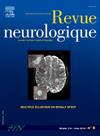Self-reported outcomes and quality of life of patients with non-dystrophic myotonia: The French IMPACT 2022 survey
IF 2.8
4区 医学
Q2 CLINICAL NEUROLOGY
引用次数: 0
Abstract
Non-dystrophic myotonias (NDM) are disabling genetic diseases that impact quality of life. To reduce the impact of NDM, patients develop coping strategies such as lifestyle adaptation and avoiding key triggers. To understand how myotonia affects patients’ lives, the IMPACT survey, an online questionnaire on patient-reported outcomes, was developed based on international IMPACT questionnaire. The French IMPACT 2022 survey was completed by 47 NDM French patients. Besides muscle stiffness (98%), patients reported muscle pain (83%), falls (70%) and anxiety (77%). These issues negatively impacted abilities to work/study (49%), daily life at home (49%) and overall mobility outside (49%). Most patients (96%) reported ongoing pharmacological treatment (mexiletine, 91%) associated with improvement in muscle stiffness (100%) and reduction in falls (94%), muscle pain (87%) and anxiety (80%). Patients were moderately satisfied (19.1%), satisfied (42.6%) and very satisfied (29.8%) with the current management; 32% rated their quality of life positively (≥ 8 on 10-point scale). In conclusion, this French survey confirms the impact of myotonia on daily life and quality of life. The improvement in patient-reported outcomes in treated participants highlights the importance of managing myotonia with effective treatments. More work should be initiated to assess the importance of NDM symptom management and patients’ adherence and compliance to treatment.
非萎缩性肌张力障碍患者的自我报告结果和生活质量:法国 IMPACT 2022 调查。
非萎缩性肌营养不良症(NDM)是一种影响生活质量的致残性遗传疾病。为了减少 NDM 的影响,患者会制定应对策略,如调整生活方式和避免关键诱因。为了了解肌张力障碍对患者生活的影响,我们在国际IMPACT调查问卷的基础上开发了IMPACT调查,这是一份关于患者报告结果的在线调查问卷。47 名法国 NDM 患者完成了法国 IMPACT 2022 调查。除肌肉僵硬(98%)外,患者还报告了肌肉疼痛(83%)、跌倒(70%)和焦虑(77%)。这些问题对工作/学习能力(49%)、家庭日常生活能力(49%)和户外整体活动能力(49%)产生了负面影响。大多数患者(96%)表示正在接受药物治疗(美西律汀,91%),肌肉僵硬得到改善(100%),跌倒(94%)、肌肉疼痛(87%)和焦虑(80%)有所减轻。患者对目前的治疗方法表示基本满意(19.1%)、满意(42.6%)和非常满意(29.8%);32%的患者对自己的生活质量给予积极评价(10 分制≥ 8 分)。总之,这项法国调查证实了肌张力障碍对日常生活和生活质量的影响。接受治疗者的患者报告结果有所改善,这凸显了通过有效治疗控制肌张力障碍的重要性。应开展更多工作来评估非传染性肌张力障碍症状管理的重要性以及患者对治疗的依从性和顺应性。
本文章由计算机程序翻译,如有差异,请以英文原文为准。
求助全文
约1分钟内获得全文
求助全文
来源期刊

Revue neurologique
医学-临床神经学
CiteScore
4.80
自引率
0.00%
发文量
598
审稿时长
55 days
期刊介绍:
The first issue of the Revue Neurologique, featuring an original article by Jean-Martin Charcot, was published on February 28th, 1893. Six years later, the French Society of Neurology (SFN) adopted this journal as its official publication in the year of its foundation, 1899.
The Revue Neurologique was published throughout the 20th century without interruption and is indexed in all international databases (including Current Contents, Pubmed, Scopus). Ten annual issues provide original peer-reviewed clinical and research articles, and review articles giving up-to-date insights in all areas of neurology. The Revue Neurologique also publishes guidelines and recommendations.
The Revue Neurologique publishes original articles, brief reports, general reviews, editorials, and letters to the editor as well as correspondence concerning articles previously published in the journal in the correspondence column.
 求助内容:
求助内容: 应助结果提醒方式:
应助结果提醒方式:


